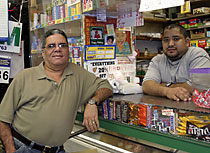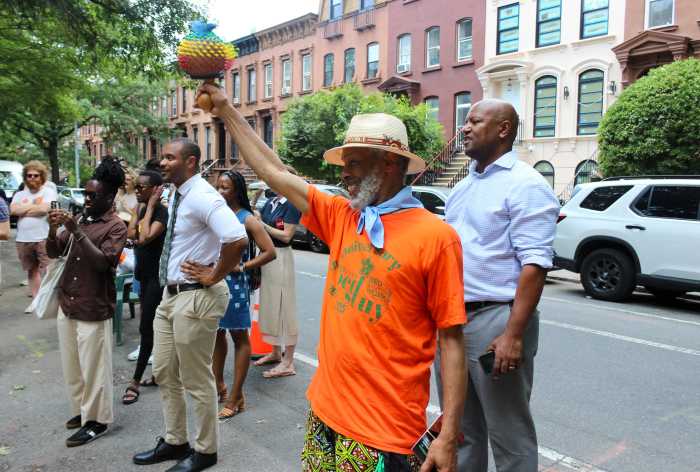In the glossy-brochure world of real estate investment, where untouched
architectural details of brownstones are of greater value than the tenants
who rent them, it’s easy for dusty, low-end corner stores, or “bodegas,”
like Peralta Supermarket in Prospect Heights, to get swept out.
The Peralta family has owned the shop at the corner of St. Mark’s
and Carlton avenues for 20 years. But as they’ve discovered, just
because they own it, doesn’t mean the shop is theirs.
As speculation about the proposed basketball arena, office towers and
housing development just two blocks away grows, the price of property
in Prospect Heights is skyrocketing.
Corcoran Group fliers distributed in mailboxes and on doorsteps tout recent
sales in the area reaching nearly $2 million for a two-unit brownstone.
“If you’re thinking about selling, let me help you get the word
out on all this neighborhood has to offer — nobody knows Prospect
Heights better,” flaunts a postcard signed Terry Robison, one of
Corcoran’s Fort Greene brokers.
One of the owners who listened was Peralta’s landlord, George Schwartz,
of Sheepshead Bay.
When Schwartz failed to renew their $1,173-a-month lease, which expired
at the end of April, they weren’t sure why. So they asked him what
was going on.
“‘Nothing is going on,’” Rafael Peralta, 30, said
Schwartz told them. So they continued to pay their rent with no lease,
while the three residential tenants in the building had theirs renewed.
Then came the men from Corcoran. Meeting the storeowners, they said they
were thinking of buying the brownstone.
“The landlord said he didn’t want to give me a new lease, but
he would help and arrange one with the next owner,” said Rafael,
who also goes by Junior.
“An affordable one,” added his father, Leo Peralta.
Rafael gave the interview, and translated for Leo, 60, an immigrant from
the Dominican Republic who opened the store and worked there full-time
with his wife, Marina, 50, from 8 am to 10 pm every day except Sundays,
when they closed at 8 pm.
“He said to us, ‘Oh don’t worry, they’re not going
to run you out, they’re going to help you out.’”
Schwartz confirmed the offer.
“I certainly did. I certainly did. That’s about all I have to
say,” he said, hanging up.
City records show that Schwartz bought the brownstone in 1968 for $20,000.
In August, he sold it for $1.2 million to three real estate agents who
work for Corcoran in Brooklyn Heights.
The property is currently listed on Corcoran’s Web site, with an
asking price of $1.8 million after months of renovations, said Nick Arnold,
one of the ownership partners.
Arnold, a senior sales rep with Corcoran, said no deal was ever discussed
with Schwartz about Peralta Grocery.
“I have no knowledge of that,” he said. “Frankly, whatever
happened with their previous owner is none of our business.”
Leo Peralta told The Brooklyn Papers he had already thought of selling
the store, but had hoped he would get a lease from Schwartz before the
building sold.
But the new buyers upped the rent to $1,500, just for them to stay with
no lease. Or, reasoned Arnold, they could sign a lease for the going market
rate of $2,500.
Peralta began to liquidate the store, which he rented for $700 a month
when it opened.
“We couldn’t afford that. We can’t afford that. They told
us that’s what they had,” Rafael said. “They came over
and put up a sign that said ‘Store for Rent.’”
Arnold, who is handling the sale through Corcoran, said they’ve already
had “several” offers from restaurants about leasing the ground
floor, with one for a French restaurant, which they favor.
“We thought a restaurant would be a good addition to the neighborhood,”
he said, adding, that another grocery store, or a florist shop could work,
too.
He said they had offered discounted rent to the Peraltas, as well as “first
option” as an existing tenant.
The discount? Pay $2,500 a month in rent and secure the rate for five
years, said Rafael Perlata, instead of being subject to increases that
fair market would demand.
“For the amount of money they want, if we can’t make it, with
a grocery store that’s not that big, I don’t think [restaurants]
are going to make it. It’s not a busy area.
“This is a neighborhood store; if it’s hard for us, I can’t
imagine what it will mean for them,” Rafael Peralta said.
Leo Peralta said he’s been looking for new space but everything is
too expensive. Friends have gone out of business, he said, and though
he was stable four years ago, “Now I’m facing losing everything.”
Corcoran’s Arnold said it was a good time for buyers, because the
arena plans, in his view, improve the whole market.
“If they do everything they propose to, it should improve property
values,” he said.
Leo admitted the neighborhood was changing, but thought that just made
things expensive.
“People believe this is the next Rockefeller Center,” he said,
adding that he could not bear to raise prices for his customers.
“If you raise [prices] you make it difficult for people to buy from
you, because you make it too expensive for them,” he said.
Patti Hagan, a longtime resident, said having the shop creates a “safety
zone” in an area that suffers the crimes of any gentrifying area.
“People go there to meet,” she said. “There are all these
kinds of friendships that develop over the counter.”
Laura Leopardo, 48, has lived on St. Mark’s Avenue for 10 years with
her husband and 10-year-old son, and doesn’t want a restaurant.
“There’s lots of great restaurants in the area,” she said.
“I love the bodega! I buy my toilet paper there, detergent, coffee,
they’re right there, and it’s like family.”
She said she feels its like “a remnant of olden New York that’s
disappearing. Everything’s becoming homogenous.”
“How can they sleep at night knowing they’re putting someone
out of business?”























